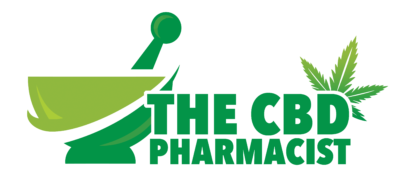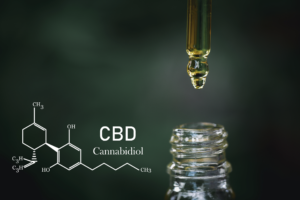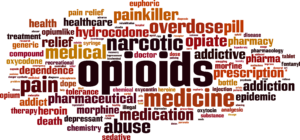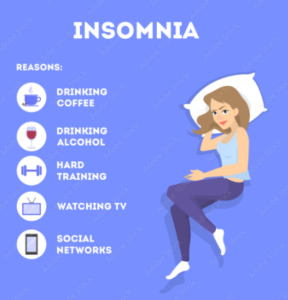Anxiety disorders are the most common mental illness in America, affecting over 40 million adults. Mental health conditions account for many of the top causes for disability not only here in America but also worldwide — conditions such as: major depression, manic depression (bipolar), schizophrenia, and obsessive compulsive disorder. You may think of these as something that only affects a small subset of the population but the numbers I found were surprising!
- 1 in 4 adults will suffer from a diagnosable mental illness in one year.
- Almost 10% of adults suffer from a depressive illness such as major depression or bipolar disorder.
- Almost 20% of adults aged 18-54 suffer from an anxiety disorder such as PTSD, OCD, general anxiety disorder, and phobias.
I would like to explain a little more about the manifestations of these disorders which will help us to understand why CBD is potentially a good fit for this population group.
- Anxiety disorders differ from a normal emotional reaction because they involve excess fear and anxiety, and typically cause reactions out of context for the situation.
- Anxiety doesn’t just cause emotional struggles but also physical symptoms such as irritability, chronic fatigue, dizziness, and more.
- Anxiety disorders are the most common mental illnesses and will affect over 30% of Americans during their lifetime.
- Nearly 50% of Americans diagnosed with depression are also diagnosed with anxiety disorder.
- Though highly treatable, only about 1/3 of people affected receive adequate treatment or counseling.
- Nearly 300 million people worldwide struggle with a form of anxiety disorder.
- The effects of Covid on depression and anxiety are vast and difficult to identify because it affects so many areas of our lives. A survey in December 2020 by US Census Bureau showed over 40% of adults reported feelings of anxiety or stress which is up from 11% one year ago. (I’m sure these numbers are bigger and that our government is giving a conservative estimate).
CBD
When looking at CBD for anxiety I was a little discouraged at the lack of pre-clinical (animal) or clinical (human) trials. The evidence is just not the same as we see with CBD and pain. But there is still lots of positive material and I have seen many anecdotal stories that should encourage us. Let’s dig in together and see what we can find!
I want to start by talking about side effects because it will help set the stage for the benefits we see with CBD and anxiety. When talking about CBD, one of the primary side effects people experience (a small percentage), is nausea. There is a possibility this is caused by the carrier oil in the sublingual tincture which is most commonly MCT oil. While it’s possible, don’t be fooled by this red herring. The amount of MCT oil in each dose is small (less than 1ml), so while it is possible to have systemic side effects, I don’t think it’s likely.
Serotonin receptors
Serotonin levels, which are directly affected by CBD, are notorious for causing nausea and upset stomach. 90% of serotonin is stored in our gastrointestinal system which is where we see the most predominant effects. The serotonin in your intestines acts to push out whatever is causing pain or discomfort which often results in diarrhea. These receptors in the gut can also cause anorexia, nausea, and vomiting when activated. The relationship between your body and serotonin is complicated as you can see and sometimes, we observe opposite effects in different parts of the body and there will be quite a variation between people as well. This is as true for the prescription drugs that affect serotonin as it is for CBD. This class of prescription drugs that I will refer to are called “selective serotonin reuptake inhibitors” or SSRIs, and they are commonly prescribed for depression.
There are also serotonin receptors in what is called the “chemoreceptor trigger zone” in your brain which can also cause someone to feel nauseous. I do recommend taking any form of CBD with food to help settle the stomach down even if it’s not an edible form. The most predominant, non-dose related side effect of CBD is feeling queasy or having an upset stomach, which is why we start low and slow when dosing with CBD.
The effect on CB1 (from our endocannabinoid system) and 5HT1 receptors (release serotonin in our body) has a lot to do with CBD’s positive effects on PTSD, general anxiety disorder, OCD, and seasonal affective disorder. The preclinical and clinical studies that have been performed so far show positive results with minimal side effects and an excellent safety profile.
Anandamide
CBD seems to reduce anxiogenic substances which are those neurotransmitters that cause us to feel anxiety. This effect is thought to be related to the increase of anandamide in our body which is the neurotransmitter most affected by CBD. Anandamide is also called the ‘bliss molecule’ which kind of explains itself! But anandamide not only helps to reduce fear and anxiety but also helps with motivation, reward and even ovulation. Anandamide is one of the main substances excreted after a long run or vigorous workout which is also referred to as a “runner’s high.” Being a runner myself I rather enjoy this feeling and notice that it does increase my mood and helps me think more clearly. CBD has the most direct effect on anandamide of any other supplement. As an aside, one of the long term benefits I have noticed with CBD is I feel that my thoughts are more organized. I am able to think through problems more clearly and often have a “third person” perspective that I find very helpful. Now I don’t think CBD is the singular cause as I also practice meditation and mindfulness, but I do feel that it pushes me in the right direction. Sometimes it is useful to think of CBD as a strong tail wind, pushing you in the right direction as it brings our body back to a state of balance or homeostasis. This re-balancing is one of the greatest weapons in CBD’s arsenal as we look to attack any kind of mental disorder or anxiety.
Prescription medications vs CBD
When looking at prescription alternatives, the options aren’t great, which is why I am so excited about the potential for CBD. Many people are prescribed Xanax and Ativan to help with acute anxiety attacks, but these can be habit forming and have a low toxicity level (meaning they cause a lot of problems even at low doses). Antidepressant drugs like Celexa, Prozac, and Zoloft are SSRIs that increase your body’s serotonin but at a much higher level than CBD. Think of CBD like a miniature hammer being very precise and measured. Prescription drugs act like a sledgehammer that often causes additional problems other than just the one they are treating such as compressed emotions and sexual dysfunction. Because so many people experience unwanted side effects from prescription medications, I encourage them to give CBD a try, not necessarily as a complete replacement to prescription medications, but to help ease the symptoms, which might lead to less prescription drug use and thus, a lesser risk of addiction or side effects.
Safety profile of CBD
The therapeutic uses of cannabinoids has been studied extensively over the last couple of decades. While cannabis has a great safety profile, there are issues when it is overused or abused, such as a concomitant increase in anxiety, panic attacks, and emotional instability. But this refers more to the THC side of the aisle (THC is the substance in marijuana that causes impairment) and the hallucinogenic effects from which it is sought. CBD does not run into these same kinds of problems even when talking about the full-spectrum 0.3% THC products, because this is a miniscule amount of THC. While CBD does cross the blood brain barrier and affect our internal neurotransmitters, it does not produce a high or impair our cognitive functions. It’s a small difference between THC and CBD but it is oh so significant! This is important because it should give you the confidence that CBD will not make things worse and avoid the many problems that are presented by marijuana.
Which CBD formulation should I choose?
When talking about specific formulations, you can’t go wrong with either full-spectrum (0.3% or less THC) or broad spectrum (0% THC). I prefer the full-spectrum product and think that even the tiny amount of THC helps “wake up” our CB1 and CB2 receptors for maximum benefit. The important part is that you don’t get the isolate formulation. The “spectrum” part of the definition means that you get all parts of the hemp plant which includes over 100 different kinds of CBD plus tons of terpenes and flavonoids.
I think that everything works better together than apart, and this is called the “entourage effect.” You can look at water-soluble or “nano enhanced” formulations which give you quicker results, but in the long run I believe you will get the best results with the regular oil-soluble formulation that is normally found in nature. It is my opinion that the closer we get to the way nature intended it to be, the better our long-term prognosis.
Dosing
Let’s finish up and talk about dosing. The overall philosophy when talking about treating anxiety and depression is one of caution. Everyone responds differently because the reasons for what causes these conditions varies so much with each person. Without treating the underlying cause, we are only putting a band-aid on the problem. This is an important point to note when considering options. I make no promises when talking about outcomes and potential benefits, and neither should you! Since the causes for depression and anxiety are so varied then we must be patient when considering solutions too. It’s important to be patient when taking CBD. The effects on our cognitive functions and emotional well being take time, the same as it does with prescription drugs. It can be difficult because people may expect immediate results, but it is imperative that people give CBD time to produce an effect. I encourage my patients to continue to work on the source of their stress and depression, and that hopefully CBD will help enable them to do this.
If you are someone who suffers from panic attacks or more severe fluctuations in their emotional well being then looking at the form of CBD ingested can be important. When a person experiences a flare up in negative emotions, a high dose of a quickly absorbed CBD can mute this effect. Options such as inhaled or sublingual CBD give us much quicker results and can help to knock down the anxiety.
Otherwise, consistent every day dosing is the way to go. Give CBD a chance to work in your body and realize that it is gradual in nature and most often will not create dramatic results. Keep with the low and slow philosophy and build up to the 75mg-100mg range per day for most people. Chronic conditions such as depression sometimes may require a higher dosage, but I don’t recommend topping out much over 150mg-200mg. There is not any kind of set maximum dosage limit for CBD, but we do know that eventually it stops working when given at high doses. Think of CBD effectiveness like a bell curve, with the top of the bell being the most effective at say, 75mg-125mg per day, and doses that go much higher start to get less return on the CBD investment.
I recommend starting at 0.25-0.5mg per kg of bodyweight of CBD per day for those that are new to CBD. Increase gradually over the next 30 days to 1mg/kg of CBD and you can start to gauge how effective CBD will be. With anxiety and depression, you have to give at least 2-3 months to observe your own behavior and response. I don’t recommend going over 2-3mg/kg per day of CBD but everyone has to find their own limit. Don’t go thinking that just because you are having success at 100mg per day that the results will be twice as good 200mg per day.
Conclusion
In conclusion, patience is the name of the game with CBD and especially when dealing with conditions like depression and anxiety. Believing that CBD can help is just as important as what it does. Having a positive mental mindset helps this phyto-cannabinoid to work better in our body and no I’m not crazy for believing this! I’ve seen this to be true in the prescription drug world and see no reason why it won’t deliver similar results here.
The main effect from CBD is its effect on the serotonin levels in our body which have mostly positive benefits but there are some negative as well. Serotonin is a tricky substance and people will respond differently to it. The stomach upset and nausea are the most common side effects which is also the same for prescription drugs such as Zoloft and Celexa. These side effects are not necessarily dose dependent so be observant even at lower doses.
Understand that treating with CBD will take some time. The system affected by CBD is more about nudging our body in the right direction and not about creating drastic results. Some people will feel really good right away, but most will take time so don’t be discouraged if it takes some time to feel the effects! Be patient, monitor yourself, and don’t be afraid to try different formulations to see what gives you the best result (such as capsules, tinctures, patches etc..).
I wish you nothing but the best of luck in your journey and I hope that CBD can make a positive difference in your life!
The views in this document are expressly the opinion of Sean Gale RPh, and are not meant to treat, diagnose, prevent or cure any disease states or medical conditions. Please consult your physician before beginning any CBD therapy. These statements have not been evaluated or approved by the FDA. Buyer is to consume CBD at their own risk. I may be reached for further questions at seangalerph@gmail.com.




